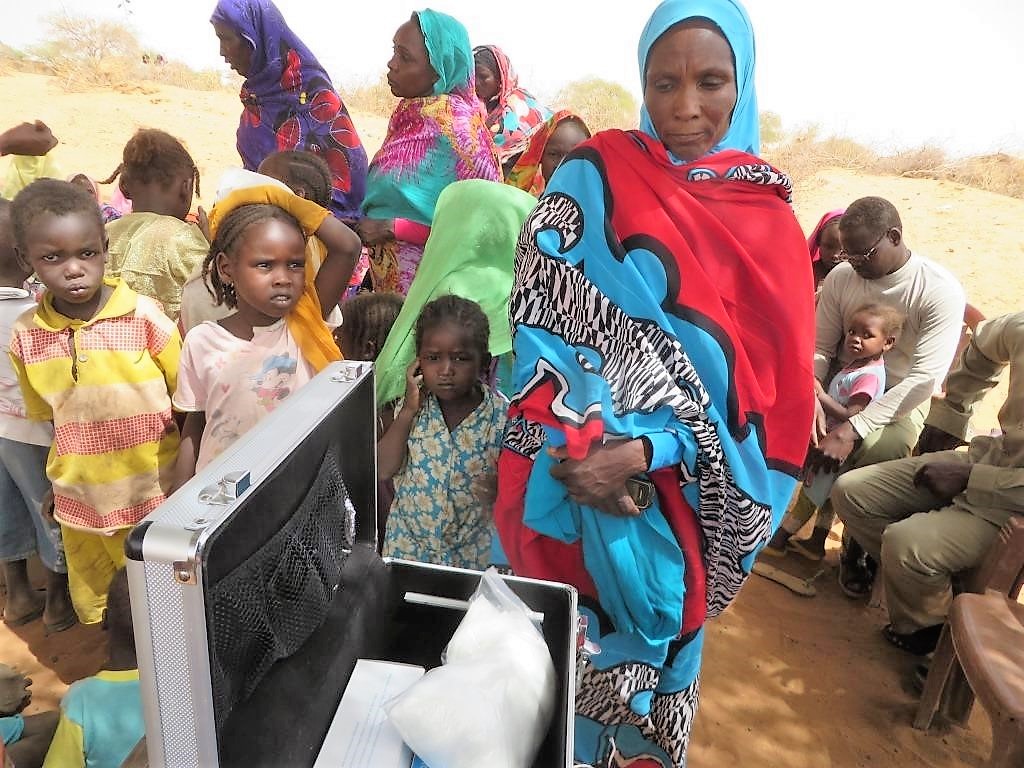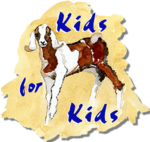
More women die in childbirth than at any other time
When KIDS FOR KIDS founder Patricia Parker MBE sat with the women in Darfur’s remote villages, they told her their biggest fear was childbirth. The thought of young mothers dying, leaving their children orphaned, because of the lack of basic medical care, made Patricia look at what would be the most effective way of helping, in the village itself. “Our whole ethos is to address problems at grass roots level, so that we prevent major catastrophes” said Patricia.
Villages have no health care. At best, when there is obstructed labour, Traditional Birth Attenders deliver the baby by rope – which is as dangerous as it sounds. The alternative is for a mother in labour to travel by donkey – or a stretcher between two donkeys – to the nearest hospital. This can be a journey of many miles. There are no roads. Rural hospitals are limited in what they can do, with few facilities for operations. If there is no medical intervention, a woman is at risk, if she survives, of fistula (uncontrollable double incontinence) which destroys her life. No one can live with a sufferer in the heat of Darfur. The life of young women, some even as young as 16 or 17, is destroyed. Because Female Genital Mutilation (FGM) is widespread, and because many women get themselves ‘repaired’ after giving birth, there is a high incidence of obstructed labour. FGM itself is dangerous with instruments not properly sterilised.
Kids for Kids is showing that by providing a trained village midwife who is known and trusted, she can encourage mothers not to continue the practise of FGM, either for themselves or for their daughters. Despite being banned by the Government of Sudan FGM is still commonplace. Our midwives are convincing women in the Kids for Kids’ villages to ban the practise.
But our Village Midwives do much more. They transform the lives of countless mothers and children, by teaching mothers basic skills such as hygiene, child care, and how to wean their babies safely. Teaching women how to feed their babies is invaluable. At times of drought, scavenging wild plants is the only food. Mukheit, a wild bean, if prepared incorrectly, is highly toxic.
Registering a child’s birth is of immense importance for their future life, yet it has been impossible for mothers to register their babies because of the difficulties and dangers of travelling to the main towns. Our Village Midwives are qualified to register births. This means that we know how many new little ones survive in our villages, and how many die. Only by having this information is it possible to monitor conditions, especially in years of drought or epidemic.
KIDS FOR KIDS asks help to fund the training of 40 midwives every 14 months. We provide medical equipment, uniforms and leather sandals, which are highly prized! Each trained midwife is given a medical kit in a tin trunk, essential to keep items sterilised in a land where the wind blows sand into everything. A solar lantern is also provided for night deliveries. Each Kids for Kids village has two trained village midwives who support each other. Trainees are selected for their strength of character and honesty and must commit to staying in their villages for a minimum of four years after their training is completed. “These women are very brave. They often have to care for their own friends and, if there is a tragedy, the presence of a second trained Midwife is of great importance,” said Patricia. Kids for Kids also provides a crossbred donkey to enable them to travel quickly to their patients, and, since the mobile network was extended into some regions, a mobile phone so they can call for our donkey ambulance in emergency. Our donkey ambulance is unique, and is often the only means of transport to hospital. “The thought of a journey to hospital on a stretcher between two donkeys is frightening” says Patricia. “Our solar lantern means that babies are not born in the smoke and light of a flickering fire. I try to think of ways of making life just a little bit easier“ she says. “Having visited Darfur so many times and talked to so many women I try to imagine what it would be like if it were me living in a straw hut, trying desperately to care for my children.”
Graduation Day for 40 Kids for Kids’ village midwives
To train a village midwife – £2,000
Donkey ambulance- £350 Crossbred Donkey-£150 Solar Lantern £150
Kids for Kids midwives are making a lasting difference. We have built a training school for midwives and – funds permitting – we train 40 midwives each year. Our aim is to have 2 midwives in each village, so they can support the community and back each other up when difficult decisions need to be made, such as when to send a complicated case to hospital.
News from our newest midwives: You will be pleased to know that this year’s group of trainees are nearly ready to graduate! They are really excited to return to their villages and help the women and babies there. No wonder people are staying in Kids for Kids villages! As one midwife told Patricia “people stay here because they know that with our help they and their children have a better chance.”
£2,000 enables us to fund the training of 1 Village Midwife
£50 provides the kit a village midwife needs to help her work – including a small tin trunk to keep it safe
£150 funds a solar lantern to help with nighttime deliveries – there is no electricity
£150 provides a strong crossbred donkey to enable a village midwife to get to her patients quickly (donkeys are the only transport
Please click here to donate now, or consider becoming a Children’s Champion and commit to funding village midwives longer term.

Registered Charity No: 1100045. A Company limited by Guarantee Registered in England & Wales No: 04607292. Recognised by the Humanitarian Aid Commission in The Sudan as a Charitable Foundation.
Copyright Kids For Kids © 1990 – 2021 US Friends of Kids for Kids Registered with Global Giving 501(c)3 Supported by HolmPC Ltd.